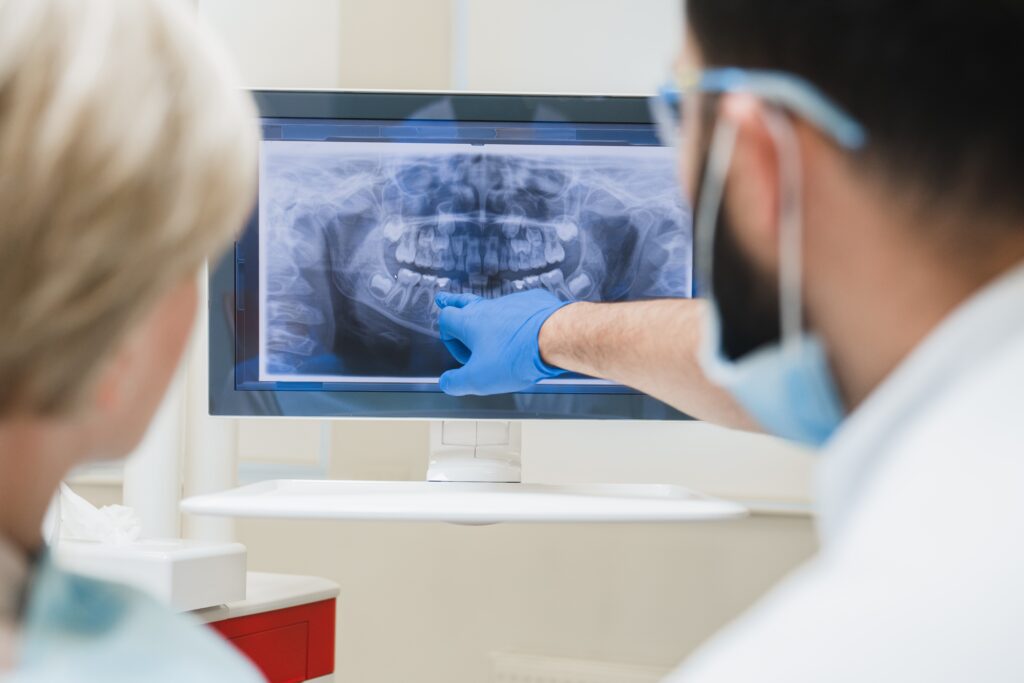For many people, the two words they most dread hearing at the dentist’s office are “root canal.” It’s unfortunate that root canal procedures have such a dubious reputation because, in reality, they are an effective, often painless way to save an infected or damaged natural tooth.
Keep reading to learn more about exactly what happens during a root canal, as well as the answers to some of the most frequently asked questions people have about the procedure!
What is a Root Canal?

A root canal is a dental procedure that treats infection or damage to the tooth’s pulp, which contains the tooth’s nerves and blood vessels. This procedure is often necessary if the tooth’s pulp has been affected by deep decay, past dental procedures, large fillings, or trauma to the tooth.
During a root canal, the tooth and surrounding area are numbed, and then the infected or damaged pulp is removed from the canals within the tooth using special dental files. Once the pulp is removed, the canals are cleaned, disinfected, and then filled with a permanent material that seals off the canals.
Often, a crown is used to cover a tooth that has undergone a root canal. A crown covers the tooth, protects it against further damage or infection, and allows it to function just like a natural tooth.
How Do I Know if I Need a Root Canal?
Significant tooth pain is the biggest sign that you might need a root canal. Other signs include heightened sensitivity to hot and cold, increasing tenderness around the tooth, swollen gums, tooth discoloration, and tooth looseness.
If you are experiencing any of these symptoms, your dentist will examine and x-ray the affected tooth to determine how to treat it. Often, getting a root canal is the best way to save the tooth.
How Long Does a Root Canal Take?
A root canal procedure usually takes between 30 to 60 minutes to complete. In some cases, the procedure can take up to 90 minutes, depending on the complexity of the tooth and the number of canals being treated.
Is a Root Canal Painful?
While root canals have a reputation for being extremely painful, modern dental techniques and anesthesia make them no more uncomfortable than other common dental procedures.
During the procedure, the tooth and surrounding tissue are numbed with local anesthesia, ensuring you feel little to no pain. Many people who have had a root canal say the experience is very similar to getting a regular filling.
Can I Drive After a Root Canal Procedure?
If only local anesthesia is used for the procedure, you can usually drive right after a root canal. Local anesthesia numbs just the treated area and should not affect your ability to drive.
If your root canal requires sedation, it’s best to arrange for someone to drive you home after the procedure. You may feel dizzy or disoriented, making it unsafe for you to drive yourself.
What Should I Expect After a Root Canal?
After a root canal, most people experience mild discomfort or sensitivity around the treated tooth for a few days. These symptoms can usually be treated with over-the-counter pain relievers.
The treated tooth is often slightly tender due to inflammation. This tenderness should gradually improve within a day or two after the root canal.
Do I Need a Crown After Getting a Root Canal?

A root canal treatment can save a tooth from decay, but it can also weaken it. Removing the infected tooth pulp can weaken the tooth’s dentin structures, increasing the risk of tooth fracture.
A crown is often recommended after a root canal to strengthen and protect the affected tooth, especially for molars that experience significant pressure during chewing. If recommended, a crown is usually placed on the tooth after it has fully healed.
What Could Happen if I Don’t Get a Root Canal?
If a necessary root canal is not done on an infected tooth, the infection can worsen and spread to surrounding tissues, increasing the risk of an abscess. An abscess, which is a pus-filled pocket, can cause severe pain and swelling around the tooth and has the potential to lead to bone loss.
Once an abscess forms, it can cause the tooth to die, and extraction may be your only treatment option. Tooth extractions can lead to more serious dental problems, like misalignments, and an increased risk of periodontal disease.
If you have an infected or damaged tooth, a root canal procedure is vital to maintaining the health of your smile. The success rate of root canals is very high, and a tooth that has undergone a root canal, especially if it’s restored with a crown, can last a lifetime.
Do you want to learn more about root canals or determine if you might need one? Schedule an appointment at Merry Dental in Billerica, MA, today!


